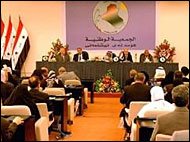
The Loyal Opposition at home -
Yesterday, Senator Joseph Biden (D-Delaware) and Ranking Member of the Senate Foreign Relations Committee, told Hardball's Chris Matthews that he hoped that President Bush can have success in Iraq. It would be crazy to want this misguided war to utterly fail. It is not disloyal to the Democratic Party to have a nonpartisan approach to foreign affairs, as does the good senator, for the most part. People of good will want success for the Iraqi people most of all.
In an interview to get Biden's "take" on our current president's surprise trip to Baghdad, the Senator, like so many of us, made it clear that he does not wish to see the U.S. effort fail in Iraq. He said that it could be successful if Bush makes it clear to the new government that they must do three things (quoting from Senator Biden's website):
“Specifically, I urge President Bush and his advisors to push for three
things to end the growing sectarian violence, which threatens to blow up into
civil war. First, we must push the new ministers of Interior and Defense to
purge the sectarian militias from the army and police. Second, we should urge
the Iraqi government to meet the deadline to amend the Constitution within four
months to gain Sunni buy-in. Third, we should – through with the UN Security
Council – convene a regional conference in which Iraq’s neighbors agree to a
hands-off policy and create a mechanism to enforce that agreement. “Right now,
the Administration does not have a strategy for victory in Iraq – it has a
strategy to prevent defeat. I hope that will begin to change at Camp
David.”
 The Loyal Opposition in Iraq -
The Loyal Opposition in Iraq -In order to feel any loyalty to the nation of Iraq, members of minorities, must have some share of the available power and resources. This is not difficult to visualize for the tribal/religious segments of Iraqi society, but is has not yet materialized for the artficially united Iraq. May 1, Senator Biden made a proposal to "maintain a united Iraq by decentralizing it," but the headline called it "partitioning" Iraq. Yesterday, the Senator corrected this for us again (during another appearance - on News Hour - with Jim Lehrer) and for his Chairman, Senator Luger, by repeating that he was not calling for a true partition, but for more autonomy and oil revenue sharing for each region. I may not agree with Senator Biden's proposal, but his point is well taken. Just as in the United States, religious or ethnic differences can separate the people of a nation. Poverty and lack of the basic necessities of food, shelter and safety can separate people here or in the Muslim world.
 Sharing power with the Opposition -
Sharing power with the Opposition - The Iraqi constitution is very new. It is yet to be modified to the satisfaction of all the people living in Iraq, so that power can be shared equitably by all. The U.S. constitution is very old, much modified, and also still vulnerable. If we are not very careful, the executive branch will have far too much power, and the original framers' careful separation of powers doctrine will be in shambles.
Loyal oppositions in both countries want both national their administrations to be successful, but not too successful at gathering power only unto themselves. Utterly partisan leaders cannot have it both ways. There are terrible trade-offs with power grabs. In Iraq lots of people are dying. In the United States, lots of people have opted out of the political process in disgust. Will the 2006 election turnout be as equally disheartening as the other recent ones?
Tags: Democrats separation of powers Iraq Senator Biden politics
No comments:
Post a Comment